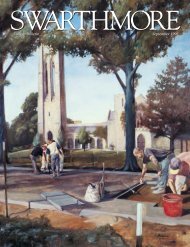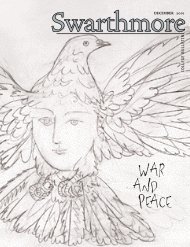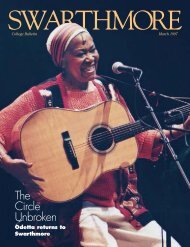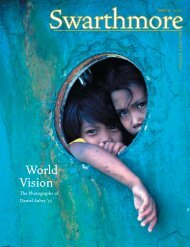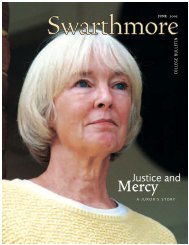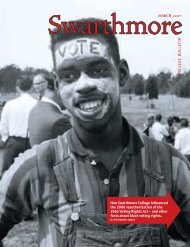TRUTH
Swarthmore College Bulletin (December 2006) - ITS
Swarthmore College Bulletin (December 2006) - ITS
- No tags were found...
Create successful ePaper yourself
Turn your PDF publications into a flip-book with our unique Google optimized e-Paper software.
in Iraq. After I was wounded and returnedto the States, I was in the National NavalMedical Center at Bethesda, Md. When myparents were first given permission to takeme off the hospital grounds for a few hours,they took me out for dinner in Georgetown.I had lived and worked in Washington for 5years, yet I remember feeling that night likeI had descended from another planet. Theurgency and seriousness of life in a combatzone had become normal to me. It wasbizarre and disorienting at that point to seepeople in America—a country at war—going about the business of having fun on aSaturday night, as if nothing was amiss.Unlike those who experienced WorldWar II—whether as soldiers serving overseasor as citizens mobilizing on the homefront—most Americans are going throughthis war with no real sense of its reality. It isdisturbing to realize that we have developeda system that allows us to carry on a warwithout its really affecting us.In Fallujah, we patrolled out of a compoundthat was located in the center of town. Welived in a boarded-up hotel, about 6 to 8Marines to a room. There’s been a debateover whether the U.S. has had enoughtroops in Iraq. Based on my admittedly limitedexperience, I would say we did not. Atthe time I was there, ours was the only U.S.battalion in Fallujah. We were tasked veryheavily. We were responsible for conductingsecurity operations around-the-clock, 7 daysa week. We conducted multiple foot patrolsevery day. When we had specific intelligenceon where insurgents or Al Qaeda fighterswere, we would conduct targeted raids, mostoften at night. The schedule was relentless,and, over time—particularly as the heatclimbed well above 100 degrees—the demandson our limited forces took their toll.We were fired on a lot during our patrols.Most of the attacks were hit-and-run jobs.Usually, the insurgents would set up anambush. They would open fire on us withrocket-propelled grenades and machineguns, and then, as quickly as they began theIt was bizarre anddisorienting to seepeople in America—a country at war—going about thebusiness of havingfun on a Saturdaynight, as if nothingwas amiss.attack, evaporate away—through alleywaysand abandoned buildings.We were trained never to stand stillwhen we were out on patrol. Even when wewere halted, we constantly moved around ina 6-by-6-foot block in an erratic way. Wecalled it our “little dance”—step forward,step back, step to the side, and so on. TheIraqi civilians probably thought we werecrazy (or high), but even though that littledance became exceedingly tedious afterhours of patrolling with 80-plus pounds ofcombat gear, it probably saved my life.The purpose of the dance was to preventsnipers from getting a bead on us. Theymight get you in their sights, but if youmoved erratically at the last moment, theyELEFTHERIOS KOSTANSmight miss—or miss just enough. On May12, a sniper did get me in his sights, andtook his shot. One thing I remember fromthe moments that followed is that, ever theSwarthmore student, I was immediately fascinatedby the physics involved. The bullettraveled faster than the sound of the shot,so I was hit before I heard the bang—thevery loud bang of a high-velocity sniperrifle. My next reaction was to be amazed,even in the moment, at how the humanbody acts to protect itself. Everythingslowed down. I heard a loud buzzing in myhead, like an alarm going off. It was as if mybody was screaming: “Something’s wrong!Something’s wrong!”I am surprised that I still had my witsabout me after the bullet knocked me to theground. I was stunned for a moment, but Iquickly remembered that I was on a streetcorner, out in the open and still in thesights of the sniper. I stood up and ran in adirection where I knew there was cover fromincoming fire.I experienced tunnel vision. I rememberhearing—but not being able to see—a sergeantwho was yelling, “Barney, over here!Barney, over here!” I ran for what seemedlike a mile but actually amounted to abouthalf of a city block. Once I got to a placewhere I felt I was protected from further fireand where the guys from my platoon couldget to me safely, I allowed myself to collapse.At that point, I passed out.I owe my life to the Marines and theNavy Corpsman I was patrolling with thatday. They got me into the back of a humveeand drove me to a surgical unit in a suburbon the other side of the city from where Iwas hit. Just 11 minutes passed from thetime I was shot until I was on the operatingtable. The Navy Corpsman who attended tome has been nominated for a medal for thesteps he took to keep me alive.I arrived at Bethesda 2 days after I washit and operated on in Fallujah, travelingthrough Balad, Iraq, and Landstuhl, Germany.They kept me in a medical comaunder sedation, so I have no recollection of28 : swarthmore college bulletin



